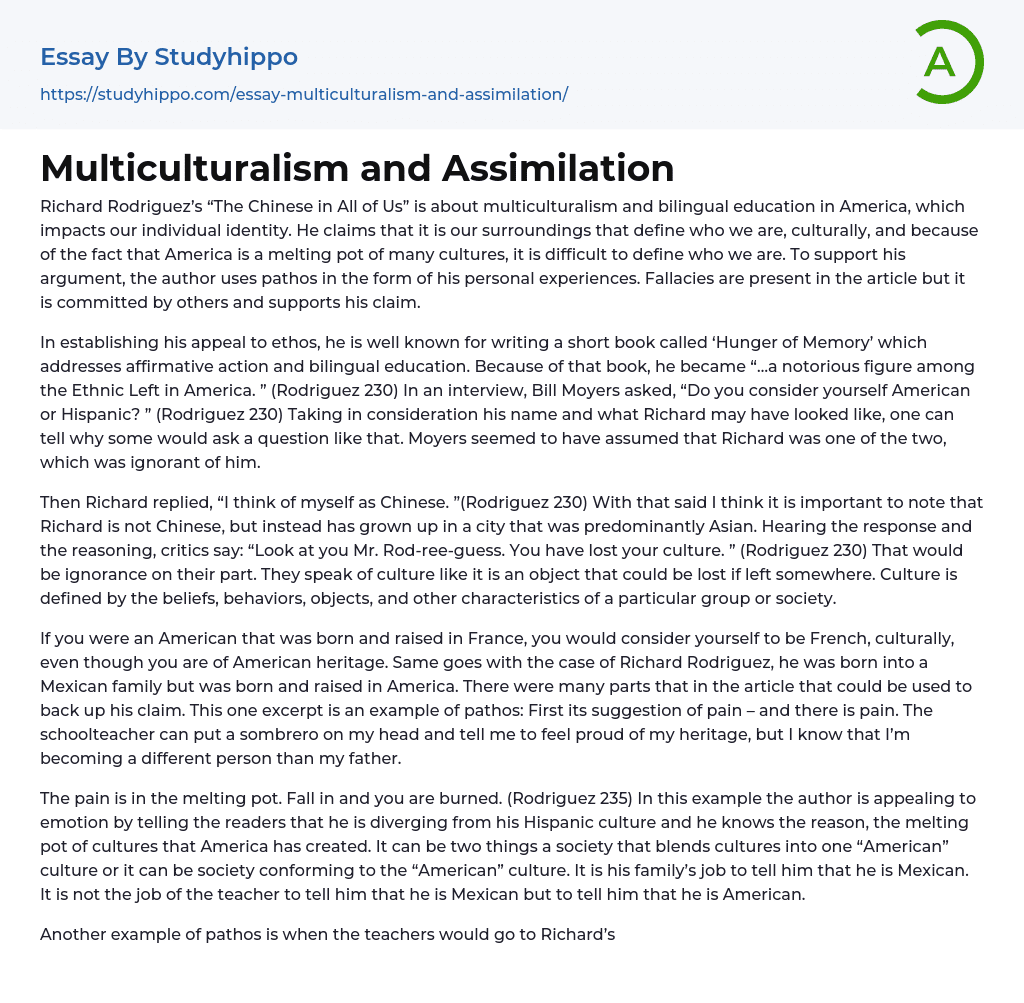Richard Rodriguez’s “The Chinese in All of Us” is about multiculturalism and bilingual education in America, which impacts our individual identity. He claims that it is our surroundings that define who we are, culturally, and because of the fact that America is a melting pot of many cultures, it is difficult to define who we are. To support his argument, the author uses pathos in the form of his personal experiences. Fallacies are present in the article but it is committed by others and supports his claim.
In establishing his appeal to ethos, he is well known for writing a short book called ‘Hunger of Memory’ which addresses affirmative action and bilingual education. Because of that book, he became “…a notorious figure among the Ethnic Left in America. ” (R
...odriguez 230) In an interview, Bill Moyers asked, “Do you consider yourself American or Hispanic? ” (Rodriguez 230) Taking in consideration his name and what Richard may have looked like, one can tell why some would ask a question like that. Moyers seemed to have assumed that Richard was one of the two, which was ignorant of him.
Then Richard replied, “I think of myself as Chinese. ”(Rodriguez 230) With that said I think it is important to note that Richard is not Chinese, but instead has grown up in a city that was predominantly Asian. Hearing the response and the reasoning, critics say: “Look at you Mr. Rod-ree-guess. You have lost your culture. ” (Rodriguez 230) That would be ignorance on their part. They speak of culture like it is an object that could be lost if left somewhere. Culture i
defined by the beliefs, behaviors, objects, and other characteristics of a particular group or society.
If you were an American that was born and raised in France, you would consider yourself to be French, culturally, even though you are of American heritage. Same goes with the case of Richard Rodriguez, he was born into a Mexican family but was born and raised in America. There were many parts that in the article that could be used to back up his claim. This one excerpt is an example of pathos: First its suggestion of pain – and there is pain. The schoolteacher can put a sombrero on my head and tell me to feel proud of my heritage, but I know that I’m becoming a different person than my father.
The pain is in the melting pot. Fall in and you are burned. (Rodriguez 235) In this example the author is appealing to emotion by telling the readers that he is diverging from his Hispanic culture and he knows the reason, the melting pot of cultures that America has created. It can be two things a society that blends cultures into one “American” culture or it can be society conforming to the “American” culture. It is his family’s job to tell him that he is Mexican. It is not the job of the teacher to tell him that he is Mexican but to tell him that he is American.
Another example of pathos is when the teachers would go to Richard’s house and asked his parents to speak English so Richard would be accustomed to it and speak it in school. I felt
pushed away. I remember going over to the sink and turning on the water; standing there dumbly, feeling the water on my hand. I wanted to cry. The water was tepid, then warm, then scalding. I wanted to scream. But I didn’t. I turned off the faucet and walked out of the room. (Rodriguez 234) Richard would not even notice his parents speaking Spanish until his parents noticed him and started using English.
He started to feel alone. He feels as though he’s starting to lose something that he was holding on to. As an introduction to some logos, the author opens with a question, “Why do we even talk about multiculturalism? ” The first reason was because of “…the influence of the great black civil rights movement…” (Rodriguez 235) The movement was a time when the African-American people did not have the same rights as the White-Americans, so they fought for the rights to coexist with society.
Today, we are able to better “…recognize the colors of America…” (Rodriguez 235) and put most of our differences aside. Throughout the article, Richard expresses his thoughts and feelings through his experiences. He wants to tell the audience how he has felt during those times and he executes it pretty well. Though the article was filled with pathos and only a little bit of ethos and logos, the author was able to effectively support his claim.
- Acceptance essays
- Age Of Enlightenment essays
- Child Observation essays
- Confucianism essays
- Conscience essays
- Critical Reflection essays
- Destiny essays
- Determinism essays
- Empiricism essays
- Environmentalism essays
- Epistemology essays
- Ethics essays
- Ethos essays
- Existence essays
- Existentialism essays
- Fate essays
- Free Will essays
- Functionalism essays
- Future essays
- Good And Evil essays
- Human Nature essays
- Individualism essays
- Meaning Of Life essays
- Metaphysics essays
- Natural Law essays
- Personal Philosophy essays
- Philosophers essays
- Philosophy Of Life essays
- Political Philosophy essays
- Pragmatism essays
- Reality essays
- Relativism essays
- Teaching Philosophy essays
- Time essays
- Transcendentalism essays
- Truth essays
- Utilitarianism essays
- Ageism essays
- Cultural Diversity essays
- Discrimination essays
- Diversity essays
- Gender Discrimination essays
- Multiculturalism essays
- Oppression essays
- Peer Pressure essays
- Racial Profiling essays
- Sexism essays
- Apoptosis essays
- Asthma essays
- Black Death essays




